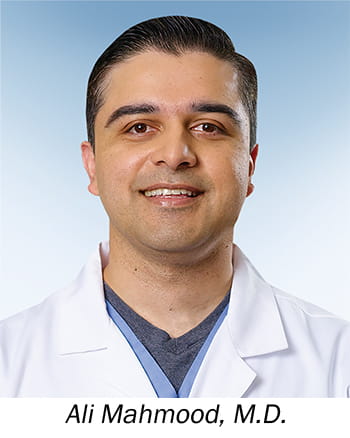Fight Back Against Colon Cancer: Colorectal Cancer Seminar
Colorectal cancer is the third most common cancer diagnosed in men and women in the United States. It is the second leading cause of death in men and third leading cause of cancer-related deaths in women in the U.S. The good news is colorectal cancer is also highly treatable when caught early, and in some cases, even preventable. Here’s what you need to know to protect yourself.
 TAKE AN ACTIVE APPROACH
TAKE AN ACTIVE APPROACH
According to Ali Mahmood, M.D., a board-certified colorectal surgeon with Houston Methodist Surgical Associates, being aware of the signs of colorectal cancer can make all the difference when it comes to your health.
“Paying attention to just a few areas can dramatically cut your risk of colon cancer as well as improve your overall health,” he said.
Here are some specific steps he recommends.
Add more vegetables, legumes, fruits and whole grains to your plate to cut fat and boost fiber intake.
“Studies show that fiber helps by keeping the digestive process moving so cancer causing wastes spend less time in the colon,” Mahmood said.
Take a 30-minute walk just three times a week to help lower your risk significantly, and reduce your risk for other diseases.
Limit your alcohol intake to no more than two drinks a day — drinking more than that may contribute to your risk of getting cancer.
Take steps to stop smoking, which plays a role in 30 percent of all cancers
EARLY DETECTION IS KEY
“Everyone should get screened for colon cancer at age 50,” Mahmood urged. “If you’re at high risk, talk to your doctor about possibly getting screened earlier and more often.”
You may be at higher risk if you:
- Have a family history of colon cancer
- Have a family or personal history of polyps
- Suffer from ulcerative colitis or Crohn’s disease
- Eat a high-fat, low-fiber diet
- Are 50 or older
A colonoscopy is the gold standard.
“During a colonoscopy, your doctor looks inside the colon using a special camera (colonoscope) that can diagnose and treat polyps when they are detected,” Mahmood said. “People who get screened regularly greatly reduce their risk of developing colorectal cancer.”
Ensure early detection by reporting any of the following symptoms to your doctor:
- Rectal bleeding
- Blood in the stool
- A change in bowel habits, including diarrhea and constipation
- Unexplained weight loss
- Anemia (low blood count)
- Fatigue
To request an appointment with Ali Mahmood, M.D., with Houston Methodist Surgical Associates, call 281.242.3300. For more information about Houston Methodist Sugar Land Hospital, visit houstonmethodist.org/sugarland. Visit our Facebook page at fb.com/methodistsugarland for the latest news, events and information.
COLORECTAL CANCER SEMINAR
One in 20 people will be diagnosed with colon cancer, and it is the one cancer that can be prevented through regular screenings. Join Ali Mahmood, M.D., colorectal surgeon, and Nitesh Vachhani, M.D., gastroenterologist, on Thursday, March 22 at 6 p.m. in our Brazos Pavilion Conference Center to learn more about colorectal cancer and take home a free colorectal cancer screening kit. Registration is required. Register at events.houstonmethodist.org/colorectal-sl or call 281.274.7500.
